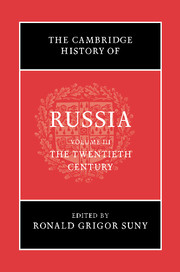Introduction
Published online by Cambridge University Press: 28 March 2008
Summary
The history of Russia in the twentieth century (and particularly the Soviet period) has undergone several important historiographical shifts in emphasis, style, methodology and interpretation. From a story largely centred on the state, its leaders and the intellectual elite, Russian history became a tale of social structures, class formation and struggles and fascination with revolution and radical social transformation. Political and intellectual history was followed by the wave of social history, and a whole generation of scholars spent their productive years investigating workers, peasants, bureaucrats, industry and agriculture. From the revolution attention moved to the 1920s, on to the Stalinist 1930s, and at the turn of the new century has crossed the barrier of the Second World War (largely neglecting the war itself) into the late Stalin period (1945–53) and beyond. In the last decade and a half the ‘cultural’ or ‘linguistic turn’ in historical studies belatedly influenced a new concentration on cultural topics among Russianists – celebrations and rituals, representations and myths, as well as memory and subjectivity. One revisionism followed another, often with unpleasant displays of hostility between schools and generations. The totalitarian model, undermined by social historians in the 1970s, proved to have several more lives to live and reappeared in a ‘neo-totalitarian’ version that owed much of its vision to a darker reading of the effects of the Enlightenment and modernity.
- Type
- Chapter
- Information
- The Cambridge History of Russia , pp. 1 - 4Publisher: Cambridge University PressPrint publication year: 2006
- 1
- Cited by



